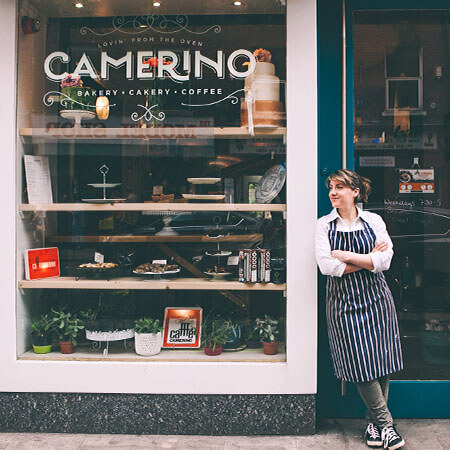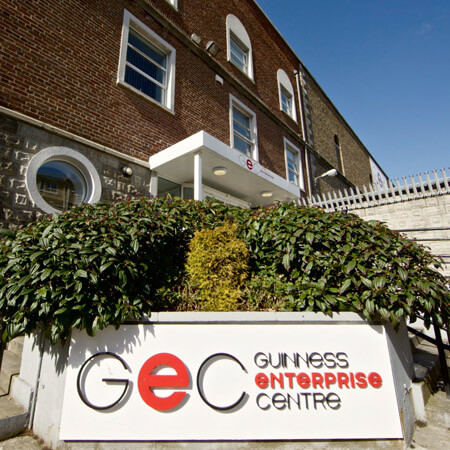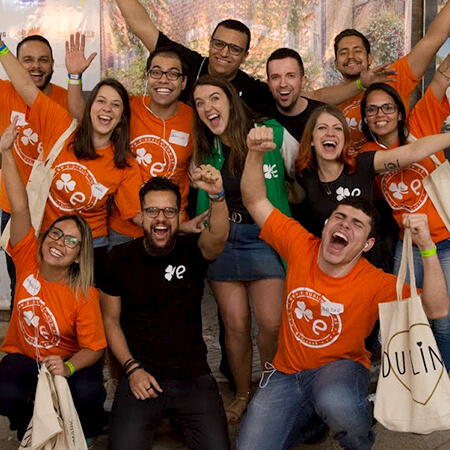Creating an immersive English language course
Travelling Languages is a Dublin-based language school, which helps English and Italian language learners quickly improve their proficiency.
By combining lessons with tourist activities, Travelling Languages creates a completely immersive language programme. These experiences help students master the language and enjoy unique experiences.
We chatted with founders Salvatore Fanara and Rosanna Fiorenza about starting their innovative business. But first, romance.
From Turin to Dublin
He was an engineer from southern Sicily. She was a banker from Turin. It was 2006.
“We met in Turin a few weeks before we moved to Ireland,” says Salvatore. “He told me that he was planning to go somewhere to improve his English,” explains Rosanna.
The pair were looking to do something different, to make a big change. So Rosanna decided to quit her job, pack her bags and join Salvatore on his adventure. They considered moving to Edinburgh or London, but in the end chose Dublin on a whim.
If I wanted to scale up my own working life I really needed to get up to speed properly from a language perspective.
“In the end, we just packed the car and drove from Turin to Dublin,” says Salvatore.
At first, Rosanna continued a career in banking. But after seven years, she’d had enough of it and wanted to do something else. That’s about the time that she and Salvatore decided to start their own business.
From life partners to business partners
“I remember thinking that if I wanted to scale up my own working life, I really needed to get up to speed properly from a language perspective with someone who’s not Italian,” explains Salvatore. He soon realised that a lot of other people felt the same.
“The starting point was when we realised that a lot of people weren’t satisfied in terms of the results they were getting from traditional language programmes,” he says. “We’d identified a gap in the market.”
Rosanna adds: “We came up with the idea for Travelling Languages in 2011 and I finally quit my job in 2013.”

So why Travelling Languages?
“We heard people saying that if you’re used to living in big capitals in Europe, Dublin is nearly a village – let’s say a town. So we said there’s not just Dublin you know – you can spend a couple of days in Dublin, but the rest of Ireland is out there too,” Salvatore explains.
“We’ll take you round the place, you’ll see lots of places, meet local people and that’s when you really feel what Ireland’s about,” he says.
In fact, as Travelling Languages brings its students from town to town, they speak with around 25 different people, including guides, pub owners, drivers and waiters – all with different accents. This is another big benefit of Travelling Languages’ programme.
“You get to understand different people very quickly,” Rosanna explains. “You can feel confident about talking to anybody at any stage – you don’t have that fear as a person who’s learning a different language: am I going to understand this guy? How many times am I going to ask ‘can you repeat that please?’”
Introducing Travelling Languages’ talk jockeys
“What happens with most language courses is that, when you finish your class, you usually open the door and go out and talk to other students – other foreigners or someone from your own country,” says Salvatore.
“…which is the worst!” adds Rosanna. “But with Travelling Languages, when you open your door, there is a talk jockey waiting for you.”
So what the hell is a talk jockey? “You know, there are DJs, there are VJs and we have TJs, because our people talk,” she explains. “So our students will spend the rest of the day with one of our talk jockeys.”

Travelling Languages usually has one TJ for every five students. This means they keep conversing in English after class, at lunch and throughout a full day of activities.
This language course is completely immersive. But students get to see a little bit of Ireland too. “From a company’s perspective, we’ve found that seeing more of Ireland can reenergise an employee’s enthusiasm for the place and the people,” explains Salvatore. He says this approach also helps students get better results.
They say the real test is how long it takes for someone to start dreaming in English. According to Salvatore, with the Travelling Languages programme, this tends to happen in just ten days – much faster than other class-based language courses.
The programme guarantees 208 hours of English exposure across a two-week immersive course, covering 760km around Ireland and helping students engage with at least seven Irish accents. Students are also provided with a tablet to access an e-learning platform, extra activities, and over 30 curated movies to reinforce what they’ve learned on the road.
So what’s Dublin like as a place to do business?
“It’s great!” says Rosanna. “We really mean it! Starting a business in Italy is difficult – there’s a lot of bureaucracy and red tape. You come here and you say ‘okay is it really that easy? I can do all this online?’”
“On average, in Italy, you might spend 60 days looking after bureaucracy,” says Salvatore. “In Ireland, it’s more like three days.”
However, this doesn’t mean that the pair don’t have days when they long for the beautiful hills of Turin. “I miss the hot summers most,” says Rosanna.
Dublin is moving on a daily basis.
Salvatore, on the other hand, likes the weather here in Dublin. In fact, it’s one of the things he likes most about the city.
“It’s never the same,” he says. “No matter what you are doing in life, whatever you are experiencing, the weather shows you that things are moving. Dublin is moving on a daily basis. The weather reflects Dublin, Dublin reflects the weather.”
What’s next?
Based in Dublin’s Docklands Innovation Park, Travelling Languages is recognised by ACELS, is a TIE (Test of Interactive English) and Trinity College London exam centre, and partners with organisations including Local Enterprise Office Dublin and the Small Firms Association.
The school has expanded its offer to include:
- Family programmes
- English + work experience
- Connemara, Northern Ireland & Wild Atlantic Way tours
- Trinity exam prep
- Evening courses in Dublin
Travelling Languages offers something unique: a chance to learn English the way it’s really spoken, by living it.
For more information, check out Travelling Languages’ website.



